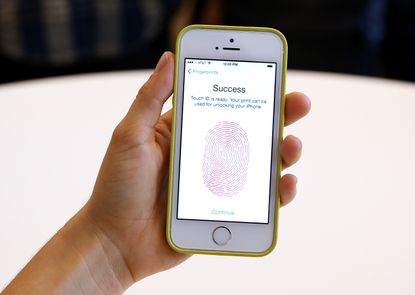The Apple vs. FBI fight is over. Now we can have an adult conversation about your iPhone.
Remember that debate about privacy versus security? It's only getting more personal.


After weeks of dire warnings from both Apple and the FBI, the legal fight over unlocking the iPhone of San Bernardino mass shooter Syed Farook ended with a whimper Monday.
The FBI said in a terse statement that it had accessed the iPhone's data and "no longer requires the assistance from Apple Inc." A law enforcement official said a company outside the government had provided the tool to circumvent Farook's passcode — a key that Apple strenuously refused to create. The Justice Department is closely guarding the third party's identity and the method used to break into the iPhone.
It is an ambiguous end to a high-profile fight over the proper limits of law enforcement and privacy rights. That's probably a good thing. Because American needs to have a serious debate about privacy versus security, and Farook's iPhone was not a helpful conversation starter.
Subscribe to The Week
Escape your echo chamber. Get the facts behind the news, plus analysis from multiple perspectives.

Sign up for The Week's Free Newsletters
From our morning news briefing to a weekly Good News Newsletter, get the best of The Week delivered directly to your inbox.
From our morning news briefing to a weekly Good News Newsletter, get the best of The Week delivered directly to your inbox.
The Apple-FBI legal battle was "a bad question to ask in a bad forum," Misha Govshteyn, the chief strategy officer at Alert Logic, said at a discussion I attended at South by Southwest earlier this month. The case was not about encryption and it wasn't really about privacy, Govshteyn said. "Apple hands over customer data all the time. In this case, it's the mechanism they're objecting to."
Michael Slaby, the head of mission at charity-focused tech consultancy Timshel, agreed that the iPhone fight was a bad jumping-off point. "There are foundational, fabric-of-our-society questions, and that's not really the level of conversation we're having at the moment," he said. Part of the problem is that the phone in question belonged to Farook, turning the case into a "pop-culture, Jack Bauer scenario" that makes for great TV but bad policy, Slaby argued. "Legislating and policy-making from a place of fear and crisis is not going to lead to good outcomes."
If Apple's battle with the FBI didn't focus on strength of encryption or appropriate government surveillance, it also didn't solve the fight between tech companies and the government. Apple will eventually patch the hole found by the FBI's hired hackers, tech companies will build more hack-proof devices and more secure methods of communication, and law enforcement agencies will demand access.
There are no easy answers — absolute privacy has real downsides, as does invasive surveillance — but waiting for the next crisis isn't a good option. And the old way of coming up with viable solutions, bringing the biggest stakeholders together in a room to talk, isn't working. President Obama has convened plenty of cybersecurity summits with technology powerhouses. But these companies feel burned by the Edward Snowden leaks, which revealed a previously cozy relationship between Silicon Valley and government eavesdroppers. Tech companies are reacting to the resulting global loss of trust and money, Govshteyn said, by "finding ways to absolve themselves of this responsibility," funding "very aggressive programs that enable them to not ever give out any [customer] information and be physically unable to do so."
Eric Berg, a former Justice Department lawyer who now works on electronic surveillance at a private law firm, agrees that tech companies will just continue to make devices harder to crack with each software update and hardware upgrade, setting up another inevitable showdown. Still, "this case has forced a national dialogue, and it really has brought this issue front and center," Berg tells The New York Times. "So the public won in the sense that this issue is now being debated."
In theory, it does seem like the perfect moment for the United States to have the debate about surveillance it so desperately needs. The nation has had three years to digest Snowden's revelations, and with a new president guaranteed to take office in less than a year, Americans can have a real say in whose balancing of privacy and security they most agree with. In reality, the five remaining presidential candidates are busy arguing over other topics, and the broader discussion has become "almost background noise in the media," as Govshteyn rightly noted.
This is a shame. If we let the conversation regress back to a fight between staunch civil libertarians and national security absolutists, the stakes will only get higher the next time it bursts into the foreground. And when it does, there may not be a hacker deus ex machina to help kick the can down the road again.
Sign up for Today's Best Articles in your inbox
A free daily email with the biggest news stories of the day – and the best features from TheWeek.com
Peter has worked as a news and culture writer and editor at The Week since the site's launch in 2008. He covers politics, world affairs, religion and cultural currents. His journalism career began as a copy editor at a financial newswire and has included editorial positions at The New York Times Magazine, Facts on File, and Oregon State University.
-
 Can AI tools be used to Hollywood's advantage?
Can AI tools be used to Hollywood's advantage?Talking Points It makes some aspects of the industry faster and cheaper. It will also put many people in the entertainment world out of work
By Anya Jaremko-Greenwold, The Week US Published
-
 'Paraguay has found itself in a key position'
'Paraguay has found itself in a key position'Instant Opinion Opinion, comment and editorials of the day
By Justin Klawans, The Week US Published
-
 Meet Youngmi Mayer, the renegade comedian whose frank new memoir is a blitzkrieg to the genre
Meet Youngmi Mayer, the renegade comedian whose frank new memoir is a blitzkrieg to the genreThe Week Recommends 'I'm Laughing Because I'm Crying' details a biracial life on the margins, with humor as salving grace
By Scott Hocker, The Week US Published
-
 How do you solve a problem like Facebook?
How do you solve a problem like Facebook?The Explainer The social media giant is under intense scrutiny. But can it be reined in?
By Peter Weber Published
-
 Microsoft's big bid for Gen Z
Microsoft's big bid for Gen ZThe Explainer Why the software giant wants to buy TikTok
By Amrita Khalid Published
-
 Apple is about to start making laptops a lot more like phones
Apple is about to start making laptops a lot more like phonesThe Explainer A whole new era in the world of Mac
By Navneet Alang Published
-
Why are calendar apps so awful?
The Explainer Honestly it's a wonder we manage to schedule anything at all
By Navneet Alang Published
-
 Tesla's stock price has skyrocketed. Is there a catch?
Tesla's stock price has skyrocketed. Is there a catch?The Explainer The oddball story behind the electric car company's rapid turnaround
By Jeff Spross Published
-
 How robocalls became America's most prevalent crime
How robocalls became America's most prevalent crimeThe Explainer Today, half of all phone calls are automated scams. Here's everything you need to know.
By The Week Staff Published
-
 Google's uncertain future
Google's uncertain futureThe Explainer As Larry Page and Sergey Brin officially step down, the company is at a crossroads
By Navneet Alang Published
-
 Can Apple make VR mainstream?
Can Apple make VR mainstream?The Explainer What to think of the company's foray into augmented reality
By Navneet Alang Published